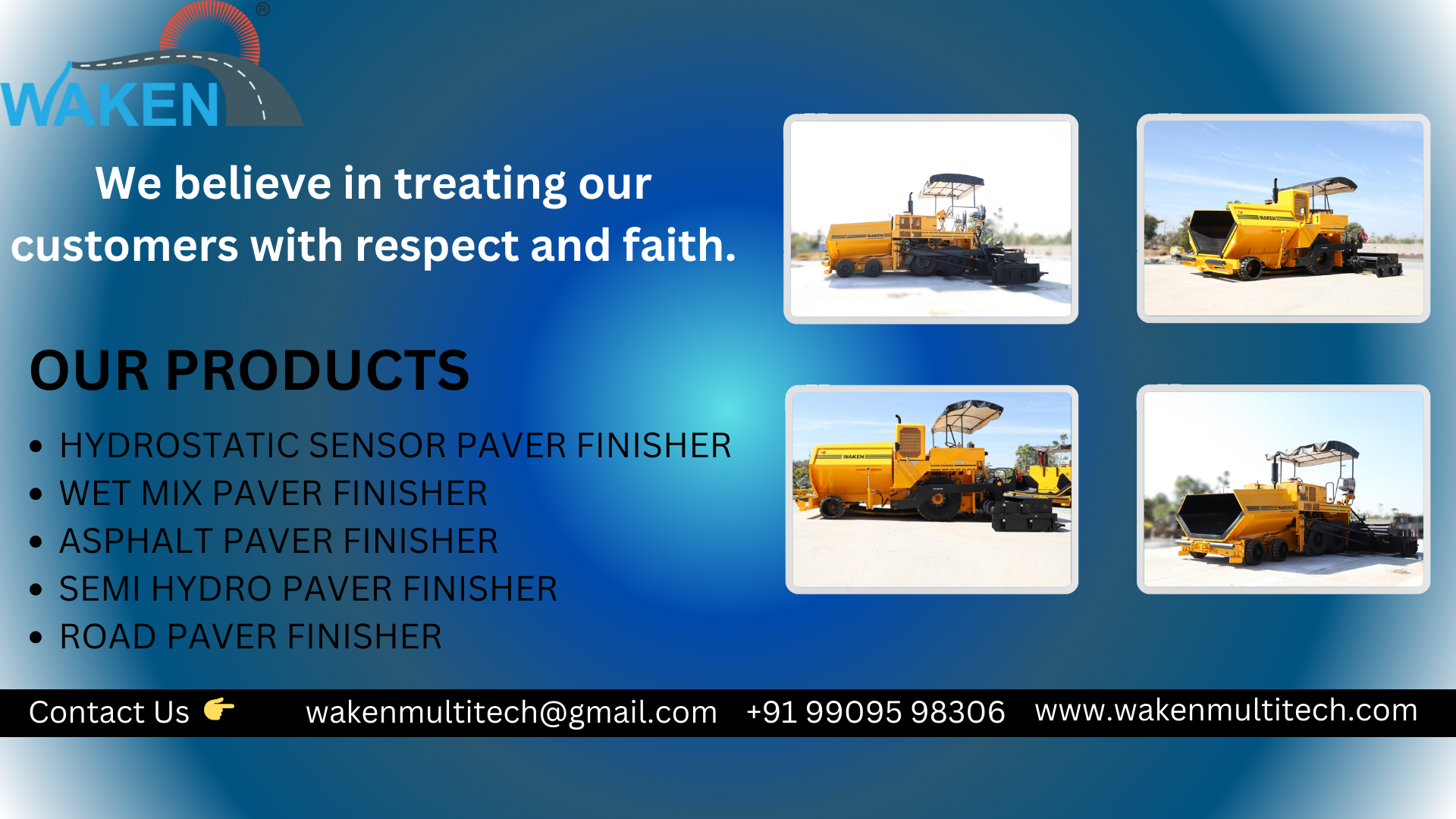Introduction to Sensor Paver
A Sensor Paver is an asphalt paving machine that uses grade and slope sensors to keep mat thickness and crossfall consistent. It improves ride quality, reduces rework, and accelerates highway and urban resurfacing. Contractors in India value accurate screeds, dependable feeders, and ergonomic controls that shorten learning curves and boost productivity. Typical applications include highways, city roads, industrial estates, and airport service lanes. For specifications, options, and support, browse our sensor paver solutions. With reliable automation and robust design, sensor pavers help meet strict evenness requirements and deliver uniform texture ready for efficient rolling.
Working Principle and Process Flow of Sensor Paver
Trucks deliver hot-mix asphalt into the hopper. Hydraulically driven conveyors move material to the augers, which spread it evenly across the screed width while maintaining a steady head of material. The heated screed floats on tow arms, levels the mix, and pre-compacts to target thickness. Grade and slope sensors reference stringlines, skis, or sonic beams to hold profile and crossfall. Operators set paving speed, vibration, and screed temperature according to mix and climate. Rollers follow promptly for density. Learn about compatible rollers and support tools on our road machinery page.
Types of Sensor Paver
- Wheeled sensor paver — higher travel speed between jobs; ideal for highways and urban corridors demanding productivity and quick relocations.
- Tracked sensor paver — superior traction and flotation; best for uneven bases, rural stretches, and thicker mats needing stable paving accuracy.
- Compact sensor paver — narrow screed range; suited for service lanes, town streets, and sites with restricted access or frequent utilities.
- Sensor paver with automation — integrates grade and slope control; recommended for expressways and runways requiring tight surface tolerances consistently.
- High-capacity sensor paver — enlarged hopper and feeders; optimised for continuous supply on big projects with aggressive production targets.
Key Features and Specifications of Sensor Paver
- Hydraulic extendable screed 2.5–4.5 m standard; bolt-on extensions enable approximately 6.0 m width.
- Dual conveyors and augers deliver uniform feed, minimising segregation across full screed width consistently.
- Automatic grade and slope sensors maintain thickness and crossfall within specified tolerances reliably.
- Ergonomic operator station, canopy, LED work lights, and emergency interlocks enhance safety significantly.
- Centralised lubrication, accessible wear parts, and diagnostics reduce downtime and overall service costs.
Applications of Sensor Paver
- National and state highway overlays requiring long, continuous pulls; sensors keep crossfall accurate, steady head of material preserves texture, and heated screeds produce uniform mats that improve ride quality, reduce rutting, and support rigorous IRC evenness criteria.
- Urban arterial rehabilitation near kerbs, medians, and manholes; precise edges and controlled head of material minimise rework, shorten lane closures, and enhance comfort while improving drainage and noise levels for commuters and public transport fleets consistently across corridors.
- Industrial estate and logistics yard pavements designed for heavy axle loads; stable feeders support thicker mats and clean tie-ins at joints, improving durability for forklifts, trailers, and mixed vehicles operating in demanding, high-turnover environments over extended service life.
- Airport service roads and taxi support lanes needing tight tolerances; sensor assistance maintains grade and crossfall, while smooth traction enables steady pulls that enhance safety during towing operations and ensure reliable drainage performance through intense monsoon conditions regionally.
Benefits of Using Sensor Paver
- Higher return on investment through faster paving cycles, reduced mix wastage, and fewer corrective passes; consistent mat quality lowers future maintenance budgets and extends pavement life under diverse traffic loads and climatic conditions across India’s regions.
- Superior finish and thickness uniformity enhance ride comfort and safety; precise sensor corrections reduce undulations and waviness, helping projects meet IRI targets and contractual evenness specifications reliably across resurfacing, strengthening, and new construction applications.
- Lower labour intensity and training time due to assisted controls; automated feeders and clear sightlines reduce operator fatigue, improve decision-making, and maintain productivity across shifts despite variable supply temperatures, truck exchanges, and changing site constraints.
- Scalable performance for varied project sizes; modular screeds, bolt-on extensions, lighting packages, and telematics allow fleet standardisation, safer operation, and compliance with evolving standards without frequent machine replacement or disruptive retrofit programmes.
Top Manufacturers and Suppliers in India
India’s sensor paver market includes established domestic manufacturers and global brands represented through regional dealers. Buyers typically compare screed heating systems, hopper capacity, conveyor and auger design, engine efficiency, and available grade or slope packages. Common options include LED lighting, bolt-on screed extensions, centralised lubrication, and telematics for usage tracking. Most vendors provide commissioning, operator training, and preventive maintenance plans supported by parts warehouses in major cities. Contractors evaluate after-sales response times, warranty coverage, and documented project references before ordering. Lead times vary by configuration and season; some suppliers maintain demonstration or stock units for quick deployment. Financing via leasing or bank tie-ups is common, with purchasers prioritising safety interlocks, reliability, lifecycle cost, and nationwide service reach.
Maintenance and Safety Tips
- Inspect conveyors, augers, and hopper daily; remove hardened mix to ensure uniform feeding.
- Clean screed plates and tamper bars after shifts; lubricate per schedule to reduce wear.
- Verify grade and slope sensor calibration weekly; check tow arms, screed crown, and alignment.
- Provide PPE, hot-mix handling training, clear communication protocols, and emergency stop drills.
- Maintain critical spares, backup sensors, propane, and fuses; store covered to protect electronics.
FAQs – Sensor Paver
Contact Details
Talk to our specialists today for tailored solutions and fast assistance.
